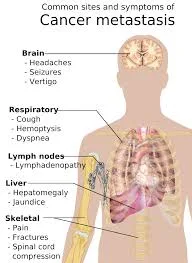Signs of Lung Cancer | Persistent Cough - Shortness of Breath - Chest Pain - Wheezing - Eight signs that may indicate the presence of lung cancer
Signs of Lung Cancer:
Lung cancer is a type of cancer that starts in the cells of the lungs. Early detection is crucial for effective treatment, so it's important to be aware of the signs and symptoms.
Here are eight signs that may indicate the presence of lung cancer:
1. Persistent Cough:
A persistent or chronic cough that lasts for several weeks or months, especially if it changes in character (e.g., becomes more severe or produces blood), could be a sign of lung cancer.
 |
| signs of lung cancer |
2. Shortness of Breath:
Difficulty breathing or shortness of breath, even with mild exertion, may be a symptom of lung cancer. This can occur as a result of a tumor blocking or narrowing the airways.
3. Chest Pain:
Pain in the chest, shoulders, or back that is unrelated to coughing or other obvious causes may be associated with lung cancer. The pain may be dull or sharp and can be felt at different locations in the chest.
4. Wheezing:
Wheezing or hoarseness that persists and is unrelated to allergies or respiratory infections may be indicative of a problem in the lungs, including lung cancer.
5. Unexplained Weight Loss:
Significant and unexplained weight loss, especially if it occurs rapidly, can be a sign of various health issues, including lung cancer.
6. Coughing Up Blood:
Hemoptysis, or coughing up blood, is a concerning symptom that requires prompt medical attention. It can occur in various respiratory conditions, including lung cancer.
7. Fatigue:
Persistent fatigue or weakness that is not alleviated by rest may be a symptom of lung cancer, especially as the disease progresses.
8. Recurrent Respiratory Infections:
Frequent respiratory infections, such as pneumonia or bronchitis, may be associated with an underlying lung issue, including lung cancer.
It's important to note that these signs and symptoms can be caused by various conditions, and experiencing one or more of these does not necessarily mean a person has lung cancer. However, if these symptoms are persistent or worsening, it is essential to seek medical attention for a thorough evaluation and diagnosis.
Risk factors for lung cancer include smoking, exposure to secondhand smoke, occupational exposures to certain carcinogens, and a family history of lung cancer. If you are at an increased risk, regular health check-ups and screenings may be recommended by healthcare professionals. Early detection through screenings can improve the chances of successful treatment. If you or someone you know is experiencing symptoms suggestive of lung cancer, it is crucial to consult a healthcare provider for a comprehensive evaluation.

Comments
Post a Comment